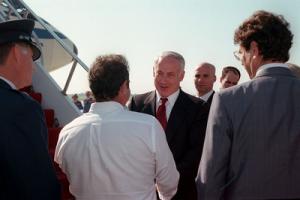SurveillanceNSA kept Benjamin Netanyahu under surveillance during Iran negotiations
As part of the effort by the Obama administration earlier this year to make sure that the negotiations between the P5+1 powers and Iran over the latter’s nuclear program would not be derailed or obstructed, the National Security Agency (NSA) kept a close watch on Israel’s prime minister Benjamin Netanyahu. The agency collected intelligence on Netanyahu and other Israeli leaders in an attempt to learn what moves the Israeli leader was planning as part of his campaign to have Congress reject the agreement the United States was negotiating.

PM Netanyahu with Israeli government official // Source: commons.wikimedia.org
As part of the effort by the Obama administration earlier this year to make sure that the negotiations between the P5+1 powers and Iran over the latter’s nuclear program would not be derailed or obstructed, the National Security Agency (NSA) kept a close watch on Israel’s prime minister Benjamin Netanyahu.
The Wall Street Journal reports that the agencycollected intelligence on Netanyahu and other Israeli leaders in an attempt to learn what moves the Israeli leader was planning as part of his campaign to have Congress reject the agreement the United States was negotiating.
Netanyahu led a wide-ranging campaign to block the agreement. That campaign culminated in an unprecedented appearance by Netanyahu before Congress in February. What was unprecedented about it was the fact that the invitation to Netanyahu to speak before Congress was arranged by Israel’s ambassador to the United States, Ron Dermer, a former Republican operative in Florida, and former Speaker of the House John Boehner (R-Ohio) behind the back of the administration — the White House and the State Department were not consulted about the invitation, or even informed in advance — and that Netanyahu was invited specifically to speak against the president’s policy and rally members of Congress to oppose it.
Analysts now agree that Netanyahu’s gambit failed, and that his unprecedented break with protocol persuaded many lawmakers who might otherwise have been open to his arguments to vote for the deal.
In the first seven or eight months of 2015, the White House was not sure how effective Netanyahu’s public campaign against President Obama would be, so the NSA was instructed to monitor Netanyahu’s communications with his senior aides and with members of Congress and leaders of U.S. Jewish groups.
The Journal notes that the increased surveillance of Netanyahu came at the time when Obama, both publicly and privately, assured leaders of allied countries that the United States would scale back its surveillance of them and their governments.
U.S. officials told the Journal that Obama felt spying on Netanyahu served a “compelling national security purpose,” and determined that it should continue.
The NSA surveillance of Netanyahu bore fruit. It allowed the agency to determine that Israel had secretly collected details of the negotiations between the P5+1 and Iran by planting bugs in the hotels where the diplomats were staying. Israel then leaked these details – and distorted some of the details on purpose – in order to generate opposition in the United States to the agreement.
Sources familiar with the surveillance program told the Journal that the program confronted the administration with an ethical, if not legal, problem. Since Netanyahu and his advisers were closely coordinating their anti-agreement campaign with GOP lawmakers, eavesdropping on Netanyahu and his advisers often meant, in effect, that lawmakers were also coming under NSA surveillance.
